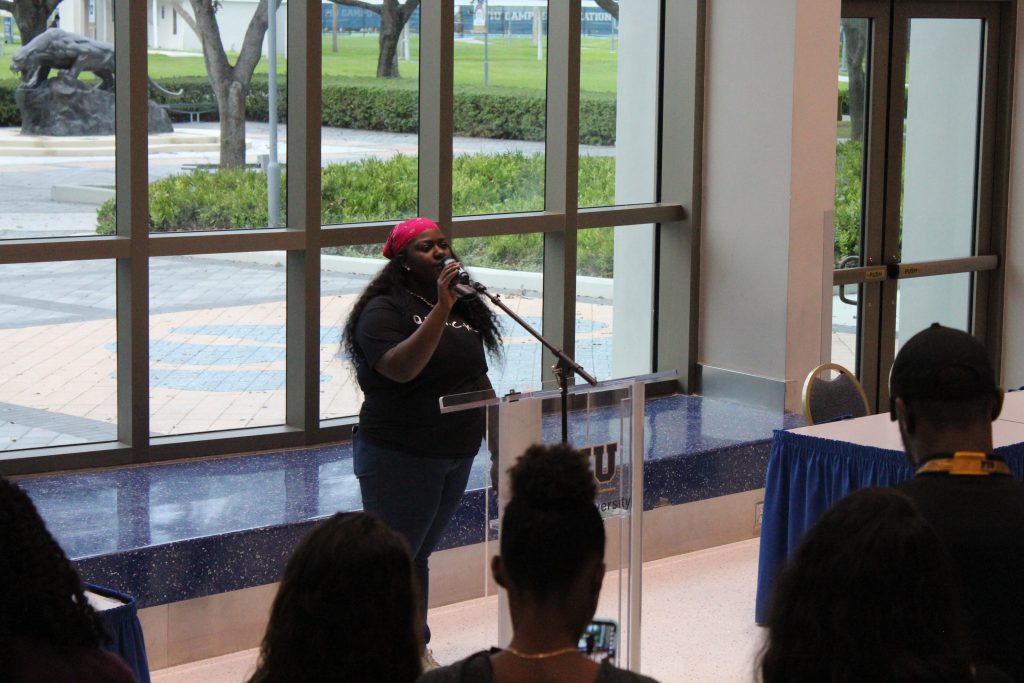Michelle Marchante/News Director
Members of the University community may be concerned about campus safety following the Las Vegas shooting on Sunday, Oct. 1, but police are equipped to keep the campus safe and secure, the department’s chief said.
While unable to give detailed explanations of what FIUPD’s tactics are, as it may compromise the safety of the campus and its officers, the department is doing everything in their power to keep the University safe, FIUPD Chief Alexander Casas said to Panther Press.
Gunman Stephen Paddock, 64, fired hundreds of bullets into the Route 91 Harvest country music festival from the 32nd floor of the Mandalay Bay hotel in Las Vegas. The attack, according to the Las Vegas Metropolitan Police Department, lasted 10 minutes and left 58 people dead and 489 wounded, making it the deadliest mass shooting in U.S. history. Paddock was found dead inside his hotel room 75 minutes after the attack.
While some have criticized the time it took police to get to Paddock, Casas believes they did the best they could under the circumstances and said those first responders were “some of the most heroic” he’s ever seen.
While Casas doesn’t know what the investigators have discovered, he does find it unusual how little information there is about the shooter. Normally a “picture” providing ideas about the shooter’s motives would have been formed by now, he said, but not much has been released to the public.
As of the time this article was written, police know that Paddock was rich, a professional gambler, a regular customer at various Las Vegas hotels, and the son of Benjamin Hoskins Paddock, a notorious bank robber who was on the FBI’s “Most Wanted” list.
Police also found at least 23 weapons in his hotel room, explosive compounds and additional weapons in his car and home, and that Paddock had sent money prior to the shooting to his girlfriend Marilou Danley, 62, who was in the Philippines at the time.
Police believe Paddock may have had an accomplice at some point, but no motive has been found yet. Evidence also suggests Paddock originally planned to survive the attack.
While FIUPD will adapt their tactics based on the information they learn about the shooting, the department is always undergoing training throughout the year for “critical instances” such as active shooters, workplace violence and disgruntled students, according to Casas.
“It’s almost like blocks,” Casas said. “One [training] goes on top of the other and we develop a much broader type of skill set.”
The New York Times reported that police may have to change the focus of their training tactics following Paddock’s high-rise sniper-style attack, but FIUPD, Casas said, was already doing this type of training because of all the open-air events the school hosts.
FIUPD also conducts drills with the University’s faculty and staff, something that Casas said is unique to FIU alone. Several drill requests have already been placed, as is common after a shooting, but Casas urges all departments to reach out to them by email to schedule a drill.
During these drills, University workers are taught in a two to four hour lecture what type of suspicious behavior to look for and how to follow the Run, Hide and Fight technique if an incident were to occur in their specific building.
The concept of Run, Hide and Fight is that if you are able to escape, run away as fast as you can until you arrive to a safe place and proceed to call 911. If you are unable to escape, get behind something that will get you out of sight and protect you from being shot. You want to become invisible so turn off your phone. Fighting is a last resort and should only be done when your life is in imminent danger. Your focus, at this point, would be to incapacitate the shooter.

Student Alicia Nwajei, a junior majoring in broadcasting sings at the vigil for Las Vegas victims held at BBC on Thursday, October 5, 2017. Photo by Brea Jones/PantherNOW.
A few days later, FIUPD along with other local law enforcement agencies will assess the building that ran the drill and have the building’s employees participate in a roleplaying scenario with them, so they can practice what they learned while under simulated stress.
If something were to occur on campus, help will arrive within minutes, Casas said, but it’s important for students, faculty and staff to help FIUPD stop these threats before they occur by letting them know of any strange activity or behavior.
“So, we as a society need to decide whether to let everyone do what they want and not worry about it or do we need to be a little more responsible for our safety…” he said.
FIUPD is always promoting “See Something, Say Something,” according to Casas, because all it takes is for you to be aware of your surroundings. If you notice some type of behavior that is strange or makes you uncomfortable, such as someone at the copy machine who is not making copies, call FIUPD and they’ll send an officer to assess the situation, he said.
FIUPD will check every potential threat or tip that is sent to them, Casas said, and these tips can be sent anonymously as well. People have the option to call and request anonymity if they choose to, they can report through the “Silent Witness” tab found at police.fiu.edu and even report an incident through the Student Conduct website. But always call 911 if it’s an immediate emergency.
FIU also spends a “considerable amount of resources” to prepare for critical instance responses, he said, such as their emergency management center. Every semester, the police gathers with members from the administration such as President Mark B. Rosenberg and Provost Kenneth Furton to run through simulated scenarios that the Department of Homeland Security recommends, such as plane crashes, active shooters, cyber-attacks and blood born pathogens.
While the University is ensuring that they are prepared for anything, Casas finds FIU to be such a safe campus, he would live on it if he could.
“If our Board of Trustees saw fit to build me a residence that I could bring in my family and my dog and of course my wife would have to have input on the design… I would move my family onto this campus,” Casas said. “That’s how safe this place is and I would do it in a second. My wife would have to approve though.”
Featured image by Nicole Malanga/PantherNOW.






Be the first to comment on "Terror Strikes Las Vegas: FIUPD addresses campus security concerns following Las Vegas shooting"